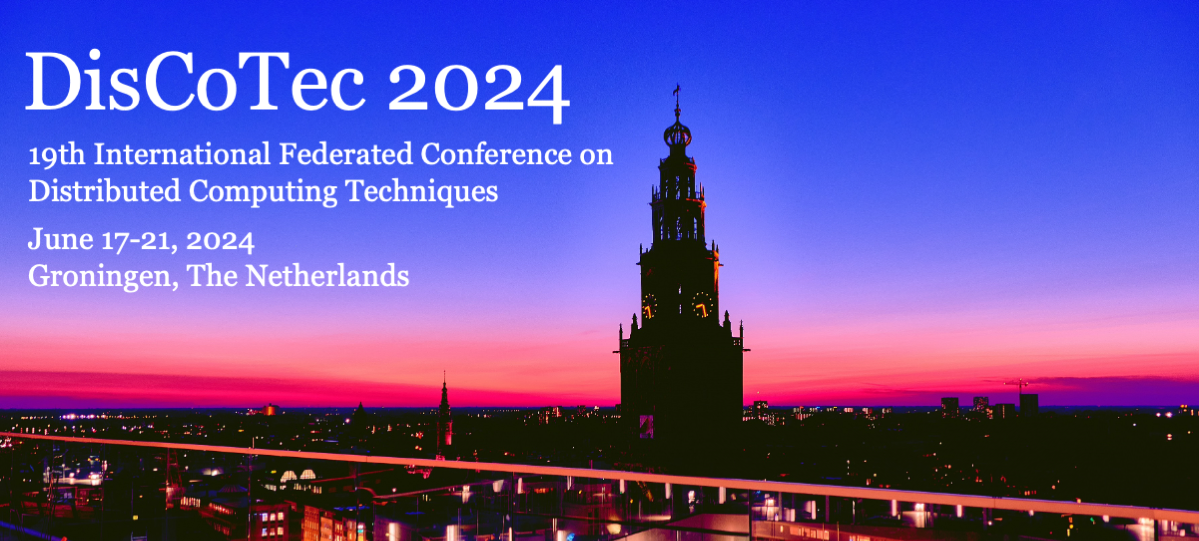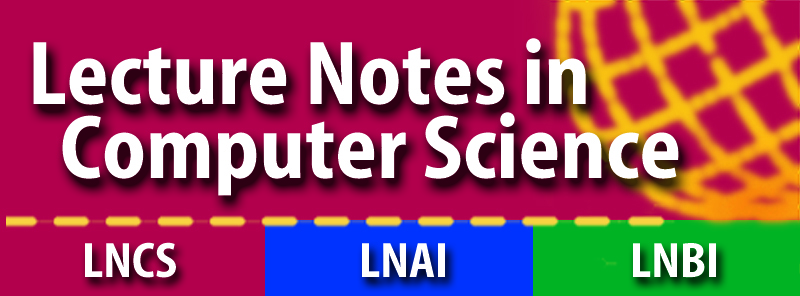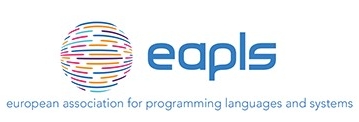 Photo by Robin Mathlener on Unsplash
Photo by Robin Mathlener on Unsplash
FORTE 2024 - 44th International Conference on Formal Techniques for Distributed Objects, Components, and Systems
FORTE 2024 is one of the three conferences of DisCoTec 2024, the 19th International Federated Conference on Distributed Computing Techniques.
Topics of Interest
FORTE 2024 is a forum for fundamental research on theory, models, tools, and applications for distributed systems.
We invite submissions focused on foundational aspects of distributed software systems, presenting approaches or tools to formally model, soundly implement, and rigorously validate these demanding but ever more necessary systems and applications. As our dependency on such software systems grow, also our responsibility as researchers grows to provide both trustworthy and usable solutions.
The main topics of interest include:
- Language concepts for concurrency and distribution, supported by rigorous semantics, well-supported pragmatics, and/or expressive illustrative use-cases.
- Analyses techniques, methodologies, and/or algorithms, using testing and/or verification, to validate (aspects of) the soundness of various types of concurrent and distributed systems, including communication and network protocols, service-oriented systems, adaptive distributed systems, cyber-physical systems and sensor networks.
- Principles for qualitative and quantitative security analysis of distributed systems.
- Applications of formal methods and techniques for studying the quality, reliability, availability, and safety of concrete distributed systems. We are specially interested in “real-life” case studies and industrial applications involving real distributed systems.
- Emerging challenges and hot topics in distributed systems (broadly construed), such as software-defined networks, distributed ledgers, smart contracts, and blockchain technologies, etc.
Submission
Important Dates (AoE)
For papers:
- Abstract submission:
February 2, 2024February 16, 2024 (Extended) - Paper submission:
February 9, 2024February 23, 2024 (Extended) - Paper notification:
March 29, 2024April 5, 2024 (Extended) - Camera-ready: April 24, 2024
For artefacts:
- Artefact submission:
February 29, 2024March 8, 2024 (Extended) - Kick-the-tires phase:
- Problem reports from reviewers:
8 March, 2024March 15, 2024 (Extended) - Authors’ response to reviewers:
15 March, 2024March 22, 2024 (Extended)
- Problem reports from reviewers:
- Artefact notification:
March 29, 2024April 5, 2024 (Extended)
DisCoTec conference: June 17-21, 2024
Submission Guidelines
Contributions must be written in English according to one of the three categories described below. Apart from journal-first papers, all papers should report on original, unpublished work, not submitted for publication elsewhere (cf. IFIP codes of conduct, under Links).
Submissions must be prepared as a PDF using Springer’s LNCS style. Submissions not adhering to the specified constraints of their respective category may be rejected without review.
Categories of Papers
All papers should be submitted in LNCS format. We solicit papers in the following categories:
- Regular papers (7-15 pages, not counting references): describing thorough and complete research results and experience reports. Regular papers may be combined with an artefact submission. Companion artefacts to regular submissions will be reviewed by the Artefact Evaluation Committee, but the acceptance of the paper is decoupled from the acceptance of the artefact (does not depend on it). The acceptance of the artefact, however, is conditional to the acceptance of the paper.
- Tool papers (7-15 pages, not counting references): describing technological artefacts in the scope of the research topics of FORTE. The paper should present the underlying theory of the tool, a clear account of the tool’s functionality and limitations, and include case studies (with rigorous experimental evaluation). In addition, the tool artefact must be submitted separately for evaluation. Acceptance of the tool artefact is mandatory for tool papers to be accepted. The artefact will be evaluated by a dedicated committee. The paper must contain a link to a publicly downloadable MPEG-4 demo video of at most 10 minutes, to be submitted until a week after the paper submission deadline.
- Short papers (up to 6 pages, not counting references): describing innovative and promising ideas, possibly in an early form, or demonstrating new tools (components), or presenting (i) calls to action, or (ii) substantiated reflections on current and/or future research perspectives related to FORTE, or a summary of a published journal paper clarifying why the presentation would enrich the program of FORTE.
Artefact Submission and Evalution Guidelines
FORTE 2024 includes an artefact evaluation performed by the artefact evaluation committee (AEC). Refer to this page for additional details.
Keynote speakers
- Marieke Huisman (University of Twente, NL)
- Laura Kovács (Vienna University of Technology, AT)
- Paulo Veríssimo (KAUST, SA)
Publication
The conference proceedings, formed by accepted submissions from any category, will be published by Springer as volume 14678 of LNCS-IFIP.

Journal Special Issue
After the conference, accepted papers (except for tool papers) selected from FORTE and COORDINATION programmes will be invited to a journal special issue of the Logical Methods in Computer Science, with the following tentative schedule:
- October/November 2024: deadline for the first submitted version;
- February 2025: notification for the first round of reviews.
Selected tool papers will be invited to a journal special issue of Science of Computer Programming’s Software Track.
Submission Link
https://easychair.org/conferences/?conf=forte2024
Program Committee Chairs
- Valentina Castiglioni, Eindhoven University of Technology, The Netherlands
- Adrian Francalanza, University of Malta, Malta
Program Committee Members
- Duncan P. Attard (University of Glasgow, UK)
- Giovanni Bernardi (Université Paris Cité, France)
- Petra van den Bos (University of Twente, The Netherlands)
- Silvia Crafa (University of Padova, Italy)
- Carla Ferreira (Universidade Nova de Lisboa, Portugal)
- Simon Fowler (University of Glasgow, UK)
- Cinzia di Giusto (Université Cote D’Azure, CNRS, I3S, France)
- Daniele Gorla (University of Rome La Sapienza, Italy)
- Ross Horne (University of Strathclyde, UK)
- Andreas Katis (KBR Inc. at NASA Ames Research Center, USA)
- Wen Kokke (University of Strathclyde, UK)
- Vasileios Koutavas (Trinity College Dublin, Ireland)
- Peter Olveczky (University of Oslo, Norway)
- Ana-Maria Oprescu (University of Amsterdam, The Netherlands)
- Kirstin Perters (University of Augsburg, Germany)
- Emanuele D’Osualdo (Max Planck Institute for Software Systems, Germany)
- Anna Philippou (University of Cyprus, Cyprus)
- Michela Quadrini (University of Camerino, Italy)
- Anne Remke (WWU Munster, Germany)
- Larisa Safina (INRIA – Lille Nord Europe, France)
- Alceste Scalas (Technical University of Denmark, Denmark)
- Simone Tini (University of Insubria, Italy)
- Dmitriy Traytel (University of Copenhagen, Denmark)
- Jana Wagemaker (Reykjavik University, Iceland)
Artefact Evaluation Committee Chairs
- Duncan P. Attard (University of Glasgow, UK)
- Emanuele D’Osualdo (Max Planck Institute for Software Systems, Germany)
Artefact Evaluation Committee
- Lennard Gäher, Max Planck Institute for Software Systems, Germany
- Bas van den Heuvel, Karlsruhe University of Applied Sciences and University of Freiburg
- Dominika Regéciová, Brno University of Technology
- Felix Stutz, University of Luxembourg
- Gerard Tabone, University of Malta
Steering committee
- Ahmed Bouajjani (University Paris Diderot, France)
- Christel Baier (University Dresden, Germany)
- Frank de Boer (CWI, Netherlands)
- Luís Caires (Universidade Nova de Lisboa, Portugal)
- Alexey Gotsman (IMDEA Software Institute, Spain)
- Einar Broch Johnsen (University of Oslo, Norway)
- Ivan Lanese (University of Bologna/INRIA, Italy – Chair)
- Jorge A. Pérez (University of Groningen, The Netherlands)
- Alexandra Silva (University College London, UK)
- Ana Sokolova (University of Salzburg, Austria)
- Jean-Bernard Stefani (INRIA, France)
- Nobuko Yoshida (Imperial College London, UK)
- Heike Wehrheim (Paderborn University, Germany)
- Tim Willemse (Eindhoven University of Technology, The Netherlands)
More Information
For additional information, please contact the Program Committee Co-chairs: forte2024 at easychair dot org

